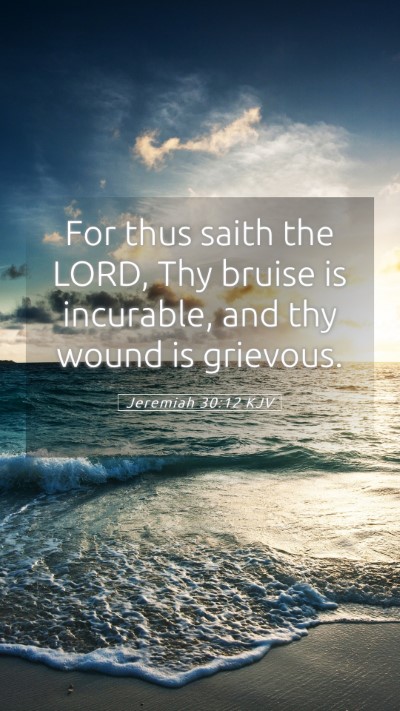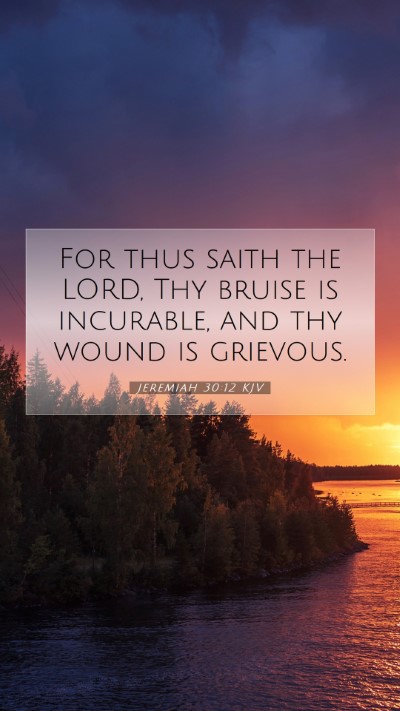Understanding Jeremiah 30:12
The verse Jeremiah 30:12 reads: "For thus saith the Lord, Thy bruise is incurable, and thy wound is grievous." This verse is significant and reflects the deep suffering and challenges faced by the people of Israel, particularly during their time of exile. Let us explore the meanings, interpretations, and insights from various public domain commentaries, which will help in gaining a deeper understanding of this scripture.
Bible Verse Meaning and Commentary
This verse offers a stark description of the people's condition, using the metaphors of a "bruise" and "wound" to convey a sense of injury and distress. The verse emphasizes the severity of Israel's spiritual and physical plight, suggesting a state of hopelessness due to their transgressions against God.
Insights from Public Domain Commentaries
-
Matthew Henry’s Commentary:
Henry elaborates that the incurable bruise signifies a deep-rooted affliction that cannot be remedied by human means, which symbolizes the seriousness of Israel’s sin and subsequent repercussions. He asserts that the physical ailments reflect spiritual conditions, where the people are plagued due to their rejection of divine guidance.
-
Albert Barnes’ Notes:
Barnes provides insight by indicating that the phrase "incurable" signifies the destructiveness of sin when it is allowed to persist without repentance. He highlights that the wound reflects not just Israel's present suffering but also serves as a warning of the consequences of alienation from God’s covenant.
-
Adam Clarke’s Commentary:
Clarke’s interpretation stresses the historical context of this prophecy, pointing out that the "grievous" wound symbolizes the nation’s severe bondage and oppression. Clarke emphasizes that despite calamities, there is a hope for eventual restoration, a promise frequently woven through Jeremiah’s prophecies.
Application and Significance
Understanding this verse allows one to reflect on the broader themes of sin, suffering, and redemption present within the Bible. It illustrates the importance of recognizing and addressing spiritual shortcomings to avoid the deeper physical and emotional wounds that result from a life disconnected from divine principles.
This message is particularly relevant for individuals and communities today, urging repentance and a return to faith in God for healing from our own "incurable" wounds—be they emotional, spiritual, or relational.
Related Bible Cross References
- Isaiah 1:6: "From the sole of the foot even unto the head there is no soundness in it; but wounds, and bruises, and putrifying sores: they have not been closed, neither bound up, neither mollified with ointment."
- Lamentations 2:13: "What things shall I take to witness for thee? what things shall I liken to thee, O daughter of Jerusalem? what shall I equal to thee, that I may comfort thee, O virgin daughter of Zion? for thy breach is great like the sea: who can heal thee?"
- Matthew 9:12: "But when Jesus heard that, he said unto them, They that be whole need not a physician, but they that are sick."
Conclusion
Jeremiah 30:12 serves as a poignant reminder of the consequences of disobedience and the dire state of those who turn away from God. It emphasizes the need for healing, not only physically or emotionally but most importantly spiritually through a commitment to a life aligned with God’s will. This verse, rich in meaning, encourages individuals and Bible study groups to delve deeper into scriptural analysis and to seek understanding and application in their lives.
The exploration of such verses is crucial for anyone engaged in Bible study or looking for Bible verse explanations. It invites believers to ponder the significant implications and personal applications in their journey towards spiritual fulfillment, restoration, and healing.


